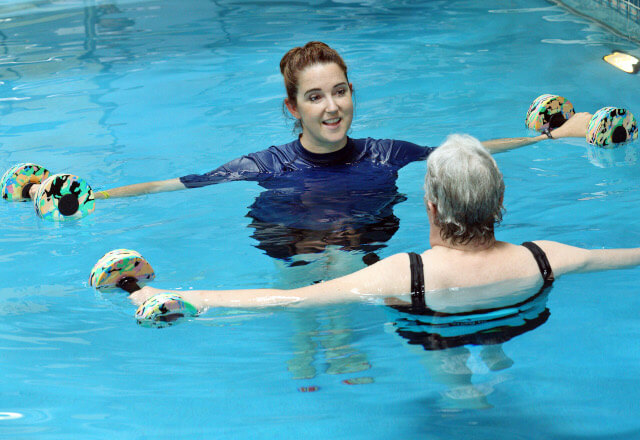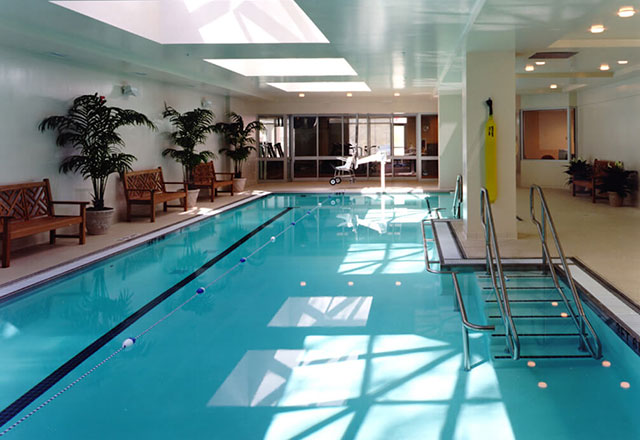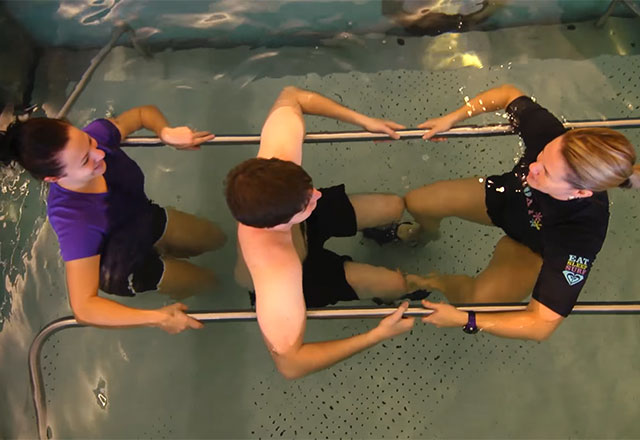Aquatic Therapy
Water can make exercise easier and less painful because it removes excessive forces on joints. Johns Hopkins Rehabilitation Network has two adult aquatic therapy locations in Maryland and Washington, D.C., and one pediatric therapy program at Kennedy Krieger Institute in Baltimore. At each of these clinics, you will receive a physical therapy plan tailored to your health concerns and based on the latest aquatic therapy research and guidelines. Aquatic-based physical therapy is usually two to eight visits with the goal of progressing to land-based rehabilitation.
Benefits of Aquatic Therapy
Aquatic exercises can help with early weight bearing, balance training, flexibility, as well as strengthening the core back muscles and improving gait. The physical properties of warm water have many therapeutic benefits.
Easy on the Joints
Buoyancy decreases weight bearing and lessens impact on joints, allowing you to perform exercises that may be difficult to do on the ground.
Less Pain
Warm water helps reduce pain by relaxing tight or spasm-prone muscles and increasing blood flow.
It's Fun
Aquatic therapy offers an engaging therapy environment that uses water’s natural resistance and buoyancy, making therapy more fun and enjoyable.
Conditions That May Benefit from Aquatic Therapy
Exercising in a pool without carrying your full body weight can help you ease into activity and start rehabilitation earlier after an injury or surgery. This is also a great way for athletes to maintain conditioning.
- Chronic pain
- Osteoarthritis and rheumatoid arthritis
- Osteoporosis and stress fractures
- Fibromyalgia
- Multiple sclerosis
- Peripheral neuropathy
- Gait deviations and balance difficulties
- Sprains and strains
- Low-back pain and spinal disorders
- Neurological disorders
- Sports injuries and orthopaedic trauma
Aquatic Therapy at the Coppermine Clinic in Timonium

Aquatic physical therapy at the Johns Hopkins Rehabilitation Network clinic in Timonium, Maryland is located in the Coppermine Health & Fitness Center. The clinic offers aquatic physical therapy to adults who have a variety of conditions that may benefit from rehabilitation in a reduced-gravity environment.
Get access to several saltwater pools ranging from 82 to 92 degrees and featuring ramp access, a chairlift, stairs with handrails, and parallel bars to accommodate people with various mobility challenges and temperature tolerances. Enjoy the guidance of experienced physical therapists trained in a variety of techniques, including the Bad Ragaz Ring Method, Watsu, Halliwick, the Burdenko Method and others.
Aquatic Therapy at Sibley Memorial Hospital

Sibley Memorial Hospital in Washington, D.C., offers aquatic physical therapy and aquatic exercise in a warm water pool. Our pool is 20 feet by 40 feet with a maximum depth of 4½ feet. A chair lift for easy entry is also located in the center. Aquatic physical therapy requires a prescription from your doctor and an evaluation by one of our physical therapists to determine if water is an appropriate setting. The evaluation is done out of the pool. Appointments are scheduled with a physical therapist or physical therapist assistant.
Sibley Aquatics will follow all CDC recommended guidelines for safety and infection prevention for all aquatic therapy sessions.
Unfortunately, we are not offering Sibley Community Aquatics classes until further notice.
Pediatric Aquatic Therapy at Kennedy Krieger Institute

Located on the top floor of our Outpatient Center at 801 North Broadway, the Aquatic Therapy Program at Kennedy Krieger features two state-of-the-art pools and an above-ground, underwater treadmill enclosed in a transparent, tempered-glass case, which increases the number of rehabilitation options. All three settings offer a range of warm-water temperatures, aquatic environments and therapeutic treatment options, depending on your child's needs.
